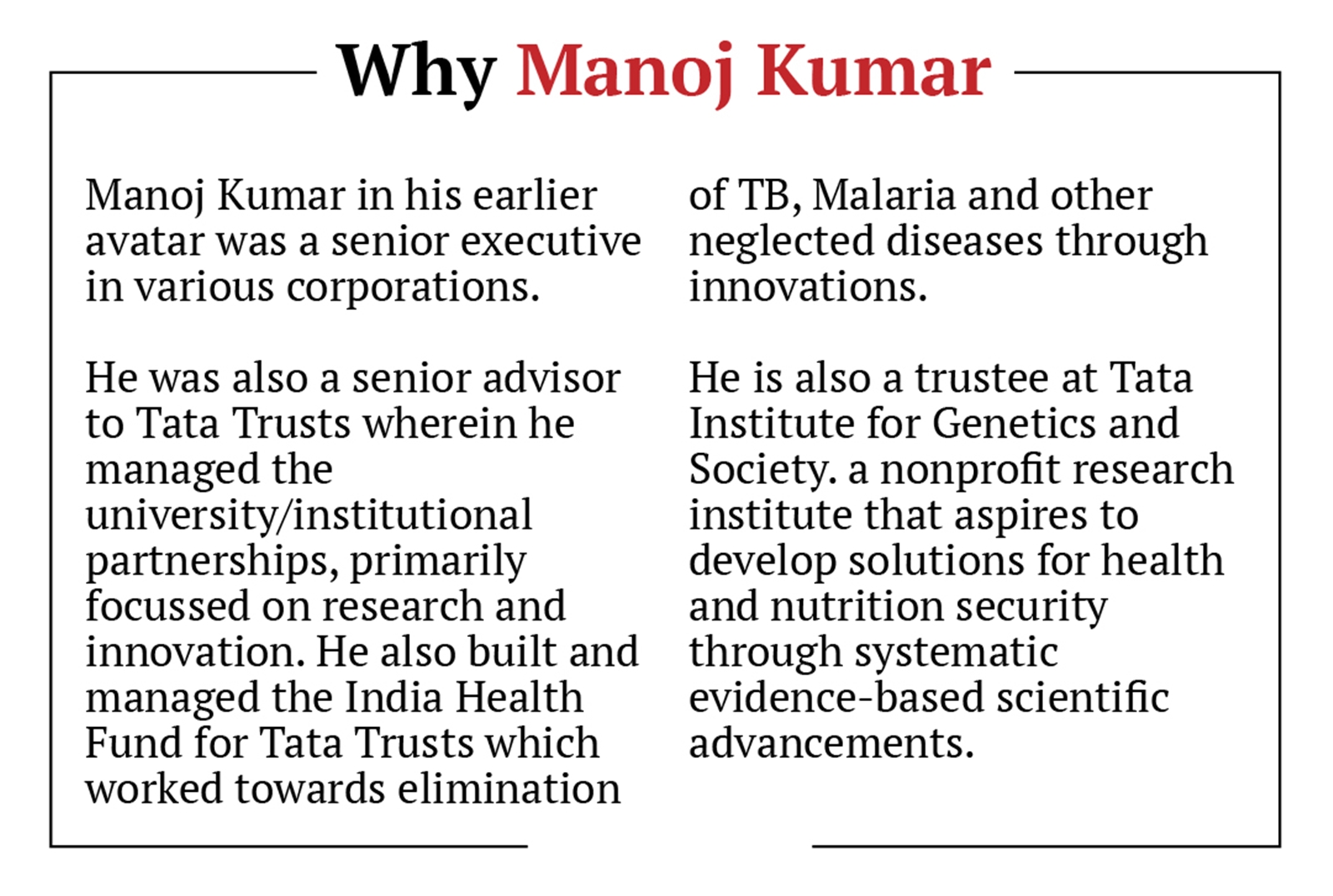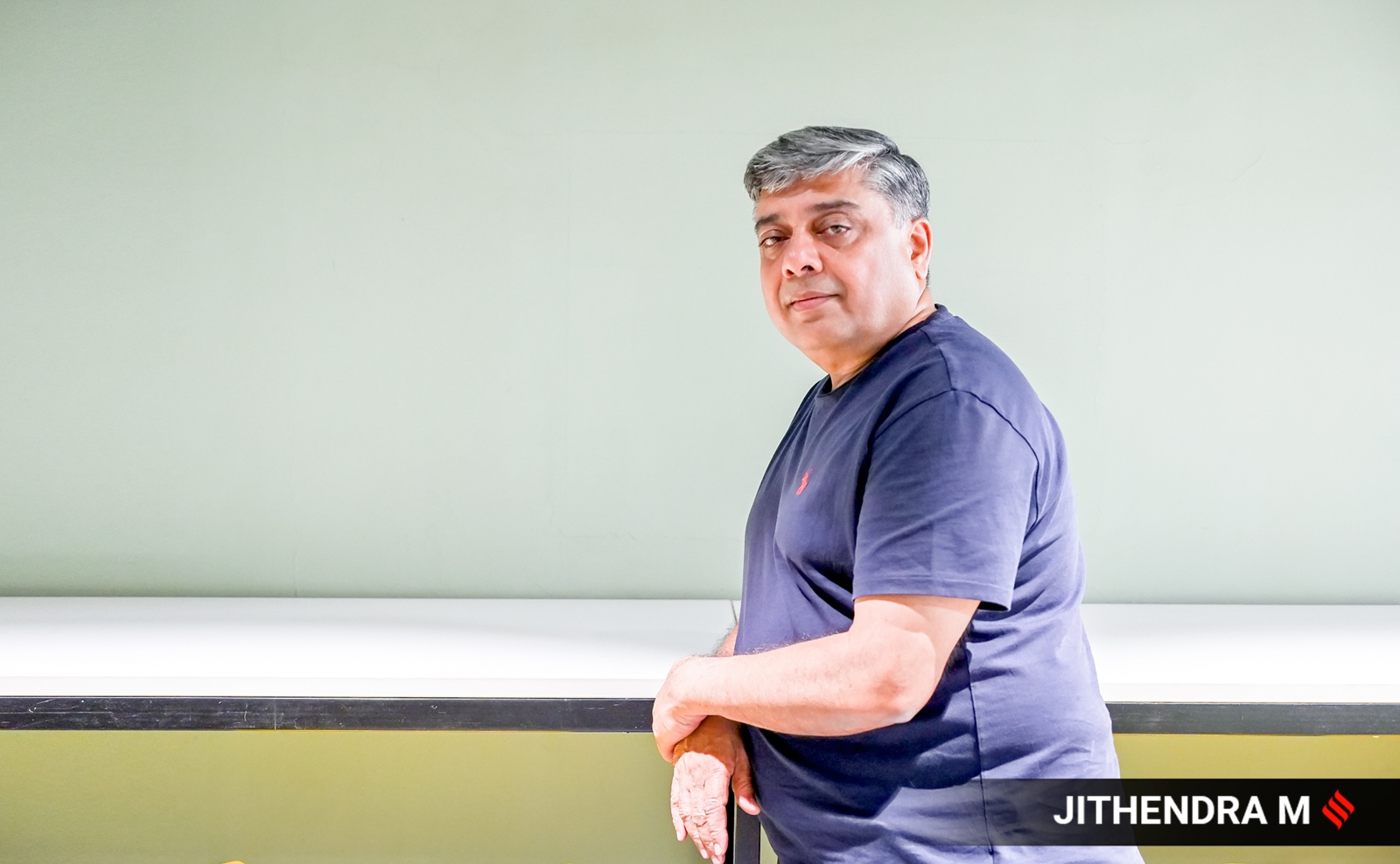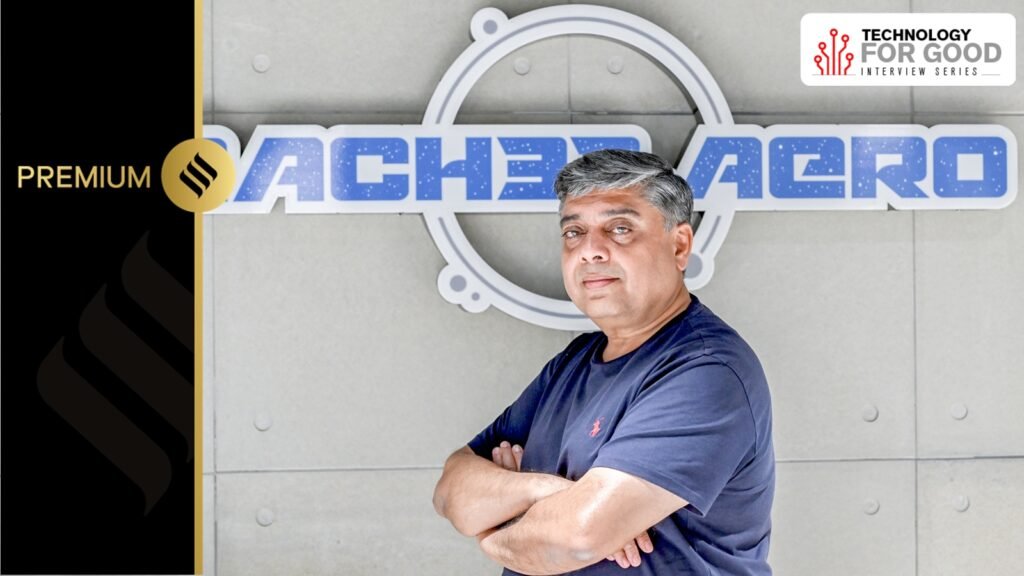Manoj Kumar is the founder of Social Alpha, a multi-stage innovation curation and venture development platform for science and technology startups in India.
Social Alpha operates in the innovation ecosystem through a network of innovation labs, startup incubators, accelerators, seed funds and market access mechanisms, with a primary focus on supporting early stage technology innovations around climate change, livelihoods and healthcare that have the potential to generate large scale social impact, unlock new markets and achieve scale and financial sustainability.
In his previous avatar (a “closed chapter” as he calls it), Manoj Kumar has held senior executive roles in banking, treasury, capital markets, technology and venture capital. He is now totally obsessed with social alpha.
He also sits on the Board of Directors of mach33.aero, a joint venture between CSIR-National Institute of Aeronautics and Social Alpha, which is addressing the challenges of building companies in space technology, precision engineering and robotics, pioneering opportunities to positively impact areas such as climate change, human health and food security.
Manoj Kumar spoke to indianexpress.com about the challenges of identifying deep-tech social impact startups, raising funds, finding markets for those companies and ultimately putting them on the path to sustainability and profitability. Edited excerpts:

Venkatesh Kannaiah: Can you give us an overview of Social Alpha’s journey, its philosophy and achievements?
Manoj Kumar: Our journey began in 2016 when we noticed a lack of innovation around issues and themes that affect marginalized segments of society, as well as certain issues that impact the wider society, such as climate change. This may have been because the market risk was too high or the challenges too great for start-ups and investors.
The challenges for entrepreneurs and startups in these spaces range from curating a problem statement to establishing product-market fit, finding markets and capital, and scaling. This is hard to do without mentors and investment partners with deep expertise in the innovation ecosystem. That’s why we’ve built a complete tech stack for the impact sector across three pillars: Labs, Ventures, and Community.


We have our own lab for product development and also have partner labs in various research institutes like IITs where the startups we incubate can work. Once the product development reaches a certain stage in the lab, we bring the startups to the venture segment where we make investments and introduce the same startups to more investors and finally to the community segment. In the community, we partner with non-profits and social sector organizations to test these products and evaluate their effectiveness. We get detailed feedback on the product from users and fine-tune the product based on that. It seems simple but this is something that only ecosystem players with deep connections to local partner non-profits can provide. Our community partners bring in a wealth of experience with problem statements that cannot be easily replicated. We then pilot these products in different locations to see if there is a demand and if people are finding value. Using our network, startups can also find the right price point for their products.
In this process, we work on market entry readiness, how to overcome regulatory hurdles and help startups accelerate their market entry and scale further. We are one of the few organizations in India that has a mentoring and support playbook across the entire social impact startup journey.
These startups face some tough challenges – market failure, mission deviation, suboptimal scale – and we work with them to solve them.
We have mentored and nurtured around 300 startups and have invested in around 90 of them. The investment amount ranges from Rs 5 million to Rs 20 million. We are onboarding more investors to help startups raise additional funds.
Venkatesh Kannaiah: Social Alpha, SustainPlus, Mach 33, how do they all come together?
Manoj Kumar: We have built numerous platforms that have engaged various stakeholders from different sectors.
Sustain Plus is a collaborative, multi-stakeholder platform focused on clean energy access, aiming to aggregate and allocate philanthropic capital from around the world to impactful projects using clean energy solutions.
mach33.aero is a joint venture between CSIR-NAL and Social Alpha, working with organisations like CSIR to build a platform for initiators of deep science leveraging advanced technologies across disciplines. We want to unlock the opportunities that technology offers and find pertinent applications in climate change, human health and food security.
We are also collaborating with the Indian Space Research Organisation (ISRO) for the SpaceTech Innovation Network (SpIN). India’s first dedicated platform for innovation curation and venture development for the space entrepreneurial ecosystem, SpIN works to empower space tech entrepreneurs across three distinct innovation categories – geospatial technologies and downstream applications, space and mobility enabling technologies, and aerospace materials, sensors and avionics.
Venkatesh Kannaiah: Tell us about some of the social impact startups and innovations that have emerged from your incubation/mentoring programme.
Manoj Kumar: Many of our incubated startups have created impactful products and raised significant funding on their journey to become sustainable companies. One such example is Voxelgrids Innovations, a pioneer in manufacturing affordable, lightweight MRI machines in India. The machines are available in both fixed and mobile modes. They can be deployed and operated in challenging installation conditions and produce high quality images for clinical diagnostics. The prototype was deployed at Sathya Sai Institute of Higher Medical Sciences, Bangalore in 2017 and raised funding from Zoho in 2021.
Hasiru Dala is a Bangalore-based pioneering venture in the waste management space that focuses on providing dignified livelihoods to waste collectors while having a significant impact on the environment.

Phool.co has developed a unique technology to recycle used flowers into artisanal organic products. Founded by engineering graduates Ankit Agarwal and Prateek Kumar, the company is a flower recycling technology startup and a pioneering biomaterial startup in India. The company manufactures natural incense sticks and cones, employing marginalized women from the community and paying them a fair wage. Phool.co has invented Fleather, a “leather made from flowers,” which is an alternative to animal leather and has the potential to revolutionize the global leather industry. The company has raised significant venture capital funding.
Satyukt analytics is an agritech company serving the agriculture and agribusiness sectors globally using satellite remote sensing technology. It is a decision analytics platform that leverages satellite remote sensing, machine learning and big data analytics to answer big questions in agriculture. The company’s technology helps crop insurance companies assess, prevent overseeding, estimate crop damage and make payments as soon as possible.
Tan90 portable cold storage simplifies the transportation of temperature-sensitive products from farm to table. Specially designed thermal panels with unique chemicals are installed inside an insulated box to keep food at the desired temperature. The product was designed to address the concerns of those left behind by large centralized cold storage infrastructure.
Khethworks develops new technologies and products for smallholder farmers. The company developed a submersible centrifugal solar-powered irrigation pump to reduce farmers’ dependency on monsoon rains and expensive fuel pumps.
Venkatesh Kannaiah: How do you think it has impacted the innovation ecosystem in India?
Manoj Kumar: We have assessed over 20,000 innovations, supported over 300 startups, funded around 90 of them, provided catalytic funding opportunities to 100, and arranged grants and market access. Through over 20 Grand Challenges, our startups have obtained over 65 patents and won 350 awards from various national and international organizations.
Social Alpha is deeply engaged with national and state governments, the private sector, academic institutions, research and development labs, philanthropic foundations, investors, non-profits and community organisations to build an extensive partner network across the innovation and investment ecosystem.
Venkatesh Kannaiah: Tell us about your lab. How is it structured and what research do you undertake?
Manoj Kumar: Impact-driven technology startups tackling problems in areas like climate change and healthcare (with a focus on access and affordability) often work on breakthrough technologies like energy storage, medical devices, advanced materials, etc. that require extensive research and development to reach a stage where they can be deployed. This is the challenge, and this is where our lab helps.
Our labs have transformed 20+ technologies, making quality healthcare accessible and affordable. 130+ innovations born in our labs have been adopted by startups in 300+ districts across the country. Specifically in medical technology, 1,000+ institutes have adopted technologies born in our labs.
The Social Alpha architecture will backward-integrate with the R&D ecosystem to jointly build labs for research, product development and venture incubation.
Venkatesh Kannaiah: How does Innovation Scouting/Grand Challenge work? What does it focus on?
Manoj Kumar: We have conducted over 20 Grand Challenges, ranging from the clean energy sector to assistive technology, agritech, healthtech, waste management and treatment solutions.
We also ran a competition for Urban Livability, a national program to discover innovators and entrepreneurs who are solving complex problems in urbanization through deep science and innovation, and many of the winners of this competition continue to work with us.

